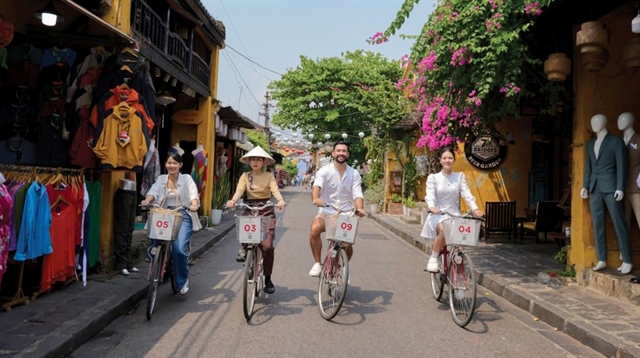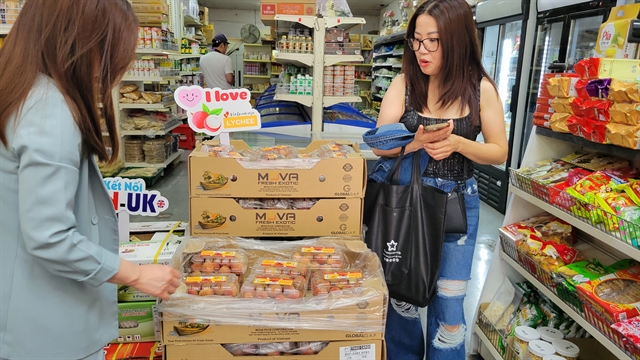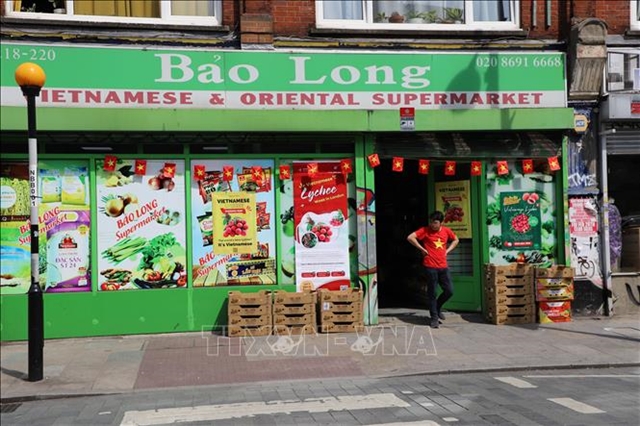 Life & Style
Life & Style


|
Q: Could you tell us more about Vietnamese Lychee Week in London and how many Vietnamese companies participated?
It was an absolute honour for TT Meridian to co-organise the inaugural Vietnamese Lychee Week in London, which ran 17-24 June. This event marked a real milestone in our drive to introduce and cultivate a strong brand for Vietnamese lychees in the discerning UK market.
#The week-long promotion was designed to familiarise British consumers with the unique flavour and superb quality of Vietnamese lychees, drawing considerable interest from both the vibrant Vietnamese diaspora and local residents.
We strategically rolled out promotional materials, eye-catching displays, and special discounts on fresh lychees across 20 Vietnamese supermarkets right here in London. A dedicated website was also launched to provide comprehensive product information and direct consumers to retail locations.
We're keen to build on this success and hope to increase our collaborations with even more supermarkets next year and in the years to come through UK-wide campaigns.
Q: This lychee season has come to its end. How much did you import to the UK market this year, and did it go as well as planned?
Our 2025 lychee season kicked off in early May with the import of the U Hồng variety of lychee to the UK. We're pleased to confirm that our final shipment of Thiều lychees for this season arrived in the UK during the last week of July, perfectly aligning with the end of Việt Nam's peak harvest period.
While we're keeping the exact import volume under wraps for competitive reasons, we can tell you that we significantly increased its import quantities this year compared to previous seasons. This really reflects our strong confidence in the growing UK market for this delightful, exotic fruit. This successful season has set the stage nicely for our ambitious target of importing over 100 tonnes next year.
Overall, the season went remarkably well, largely exceeding our initial projections. Vietnamese Lychee Week in London played a crucial role in raising consumer awareness and driving demand, particularly among new consumers beyond the traditional Asian market. We saw strong uptake, with many customers expressing delight at the freshness and quality of the lychees.
Despite the inherent fragility of the fruit, our meticulous temperature control logistics and careful handling from farm to shelf proved effective in preserving its quality. This success indicates that our market entry strategies, focusing on both cultural promotion and high-quality supply, are yielding positive results and establishing a solid foundation for future growth.

|
Q: Lychees are not a traditional fruit in the UK, so how did you get the public onboard, and what obstacles exist to make lychee more popular in Britain?
Introducing lychee, a non-traditional fruit, to the British market involved a multi-pronged approach to overcome its inherent challenges. We focused heavily on educational campaigns, utilising the Vietnamese Lychee Week in London as a central platform. This included in-store promotions with tasting sessions, informative posters and digital marketing through social media.
These efforts highlighted the fruit's unique sweet flavour, its versatility in culinary applications such as desserts and drinks, and its nutritional benefits, such as being rich in vitamins B and C, and antioxidants.
Addressing the fragility of lychees was paramount. We invested significantly in robust cold chain logistics, from immediate pre-cooling at the source in Việt Nam to refrigerated transport and controlled storage upon arrival in the UK. Our packaging was specifically designed to minimise damage during transit and extend shelf life in retail environments. While lychees are indeed fragile, advanced post-harvest techniques and efficient supply chains can mitigate this challenge considerably.
Regarding concerns for individuals with high blood sugar, we acknowledge this as a potential consideration for some consumers. Our strategy has been to promote lychees as a delicious, natural treat to be enjoyed in moderation as part of a balanced diet, similar to other naturally sweet fruits. We aim to educate consumers about the fruit's natural sugars, rather than present it as a diet food.
These factors are certainly obstacles, but our proactive approach to logistics, education and responsible marketing has demonstrated that they are surmountable, allowing us to successfully introduce and grow the lychee market in the UK.
Q: Were the Vietnamese community welcoming of their home country’s much-loved fruit?
The Vietnamese community in the UK proved to be incredibly welcoming and enthusiastic about the availability of fresh Vietnamese lychees. For many, lychee is not just a fruit; it's a taste of home, deeply intertwined with cultural memories and celebrations.
We observed a significant surge in demand from Vietnamese consumers, particularly during Vietnamese Lychee Week in London. Supermarkets in areas with large Vietnamese populations, such as Deptford, New Cross and Hackney, saw considerable footfall and strong sales, with customers eager to purchase a fruit they often miss from their homeland.
Beyond sales, the community's response was heartwarming. There was a sense of pride in seeing a beloved Vietnamese product being promoted on a larger scale in the UK. Social media engagement within the Vietnamese community was very high, with individuals sharing news of Lychee Week and encouraging friends and family to try the fruit.
This strong support from the diaspora served as a vital foundation for our market entry strategy, providing initial momentum and positive word-of-mouth that helped pique the interest of broader UK consumers.
Their welcoming reception was not only a commercial success but also a cultural affirmation, demonstrating the importance of connecting with specific communities when introducing ethnic produce to new markets.

|
Q: Who are the country's direct competitors, and what do Vietnamese lychee growers need to accomplish to maintain their niche next season?
Việt Nam faces several direct competitors in the British lychee market, including China, India, Israel and Madagascar.
China is by far the largest producer, exporter and competitor, with a significant market share. India is the second, while South Africa is a key supplier to the UK during the off-season for Asian producers, typically from November to February. Each of these countries brings its own varieties, harvest seasons and logistical strengths to the market.
To maintain and expand their foothold in the highly competitive UK market next season, Vietnamese lychee growers and exporters need to sharpen their focus on several crucial areas.
Firstly, consistent quality and stringent food safety standards are absolutely paramount. Meeting demanding international certifications like Global GAP isn't just an option; it's a necessity. The UK market places a high premium on product traceability and impeccable hygiene, so proving adherence to these standards is key to building trust and securing sales.
Secondly, improving post-harvest handling and cold chain management is essential. Lychees are delicate, and extending their shelf life while ensuring they arrive in optimal condition requires meticulous attention. This means implementing advanced pre-cooling techniques, utilising efficient and protective packaging and ensuring rapid transport from farm to UK shelves.
Thirdly, continued government support through trade promotion campaigns, such as this year's highly successful Vietnamese Lychee Week in London, will be vital. These initiatives are crucial for solidifying Vietnamese lychee's position as a premium tropical fruit in demanding markets like the UK.
Lastly, lychee exporters are highly recommended to invest in research and development. This is crucial for consistently providing the best lychee varieties to the UK market. For instance, Chinese lychees, while as sweet as Vietnamese ones, often boast more robust skins, which significantly extends their shelf life for distributors.
Furthermore, their very tiny seeds offer greater value for money for consumers, and their consistency in size, appearance and sweetness sets a high bar.
Q: The UK has a tea tradition, and combining the lychee fruit with tea has become a signature drink in Việt Nam. Would you like to bring it to Lychee Week next year?
As a connector between Việt Nam and the UK through trade and logistics, the idea of combining the UK's beloved tea tradition with Vietnamese lychee to create a signature drink is something we would be thrilled to incorporate.
Bringing this concept next year would allow us to showcase lychee beyond just a fresh fruit. We could offer tasting stations featuring various lychee-infused teas – perhaps a refreshing iced lychee green tea for warmer days, or a comforting hot lychee black tea with delicate fruit notes.
This would highlight how lychee can be integrated into daily routines and special occasions, moving it beyond a purely exotic fruit to a more versatile ingredient.
We could also collaborate with Vietnamese tea brands or even local UK tea houses to develop unique blends. Imagine demonstrations on how to prepare these teas, perhaps even small workshops during Lychee Week. This would not only appeal to the existing Vietnamese community but also pique the curiosity of the wider British public, who are inherently open to new tea experiences.
This initiative would undoubtedly add a new dimension to Lychee Week, making it even more engaging and memorable, and further solidifying Vietnamese lychee's place in the UK market. — VNS




